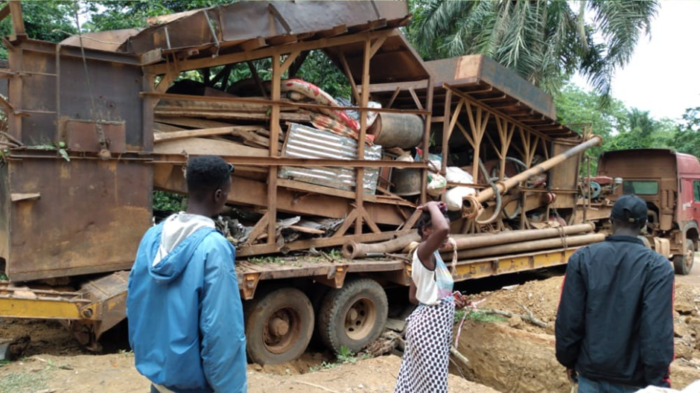Hot on the heels of the corrupt $55m Chinese fishmeal factory deal at Black Johnson in Freetown, Western Sierra Leone, as well as the attempted impalement of a Sierra Leonean worker by a Chinese manager at the Tonkolili mine in Northern Sierra Leone, we have uncovered massive, industrial-scale illegal Chinese goldmines in Eastern Sierra Leone.
The illegal Chinese goldmines are located in Penguia Chiefdom, in the far corner of Kailahun District, Eastern Sierra Leone, which the government of Sierra Leone has kept secret for the past three years.
As our off-road vehicle pulled into the very small village of Mosamba in the Pejeh-Bongre Chiefdom, a motorbike taxi with a Chinese passenger suddenly raced through the village. Upon seeing us, the rider deliberately slowed down. The Chinese passenger turned to look at us, appearing inquisitive as to who we were. Unable to identify us, they sped off up the dusty road towards Sandaru, the Penguia Chiefdom headquarters town. We were playing cat-and-mouse with them. The contact we had stopped to rendezvous with told us, ‘These are the guys who are mining gold and carrying out illegal logging in Penguia. We are frequently woken up by large mining excavators, low loaders carrying diggers, and trucks full of equipment.’
On a bright March morning, the people of Manowa town woke to find a low loader stuck in their town as it tried to negotiate its way on a diverted road after one of the illegal goldminers’ heavy excavators had broken a concrete bridge over a small river called Manee, in Manowa. Oops! This was not supposed to have happened; the low loader was a night traveller that ought not to have been seen by the people. It suddenly became a spectacle for the locals, who came in good numbers to look at the equipment.
Penguia Chiefdom has been ravaged by illegal Chinese mining and logging since the new administration came to power three years ago. The chiefdom, one of the poorest in Sierra Leone, has had its lettered Paramount Chief, PC Samuel Gibrilla, expelled. A seven-man committee of men, who can’t read or write, has been put in place to ‘manage’ the Chiefdom’s affairs.
It is under this settlement that the illegal goldminers were given the nudge by the government to operate illegally, and this has been kept a secret. Our investigation found out that the minister of mines and mineral resources, Mr Timothy Kabbah; his predecessor, Rado Yokie; the resident minister, Eastern Province, Mr Andrew Fatorma; and the president all have knowledge of the work. Local landowners are coerced by the state into surrendering their land. There are about six illegal goldmining companies operating here.
One of the lead informants told me that they weigh gold here in ounces and kilograms. It is very lucrative. The scale of the operation is mind-blowing, and it is impossible to locate all the mines by driving alone. We used satellite images to find them. We uncovered over twenty-five large-scale and active goldmines spanning several towns and villages including Sandaru, Konobendu, Saalu, Njama, and Yembelu. The largest goldmines are concentrated around Sandaru (the chiefdom headquarter town), Konobendu, Saalu and Njama.
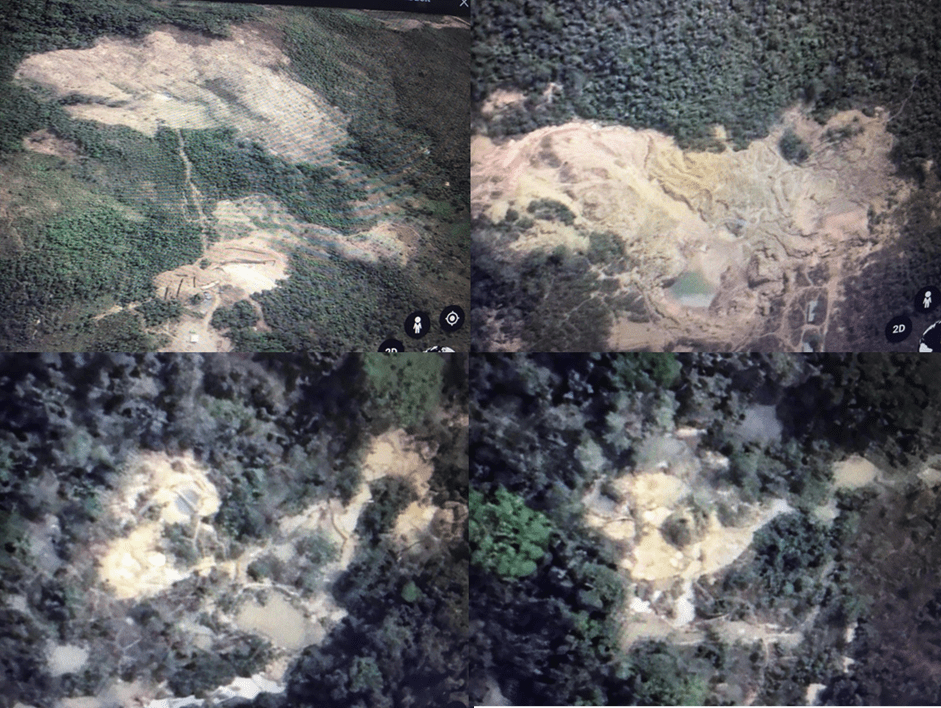
Photo: Satellite images showing four of twenty-five large illegal Chinese goldmines uncovered in Saalu and Njama, Penguia Chiefdom.
As we drove towards the interior, a grey pick-up truck, loaded with mining fuel and chemicals, pulled over to let us pass at a narrow intercept. The miners are using chemicals such as cyanide and heavy metals to separate the gold. Heavy metals such as mercury and lead are deadly. All the rivers in the mining areas, including Menee (Menee is different from Manee) are heavily polluted, creating not only human but also ecological disaster. This area is part of the Guinea Forest eco-system that spans across most of West Africa.
The river, Kpaneyee, which is the main source of drinking water and which runs from the mining villages of Saalu through to Nyamundu and Kumantandu, is overwhelmingly contaminated, which has had a major effect on the villagers’ health.
The river that runs through the villages is contaminated with chemicals and heavy metals. This satellite image shows a polluted river snaking its way through the forests and into towns and villages.
Community people have started reporting ‘new’ illnesses in women and children and in the men who work in the mines. But not even the chiefs are able to tell you what is happening here – the illegal Chinese goldminers wield so much power and influence at state level that they trample upon whatever local authority is in place. Workers here are in slave labour, and they are largely sedated with alcohol (Pega Pack, as they call it) and drugs to enhance labour output and weaken any discontent.
It is not only illegal goldmining that is going on here; we also uncovered large-scale illegal logging carried out by the Chinese in the chiefdom. The Chinese man on the motorbike who had stopped briefly to check who we were turned out to be heading the illegal logging. We counted four bridges that were broken by mining excavators and logging trucks. In the rainy season, the roads become impassable for small rural transport vehicles carrying vital food supplies for villagers.
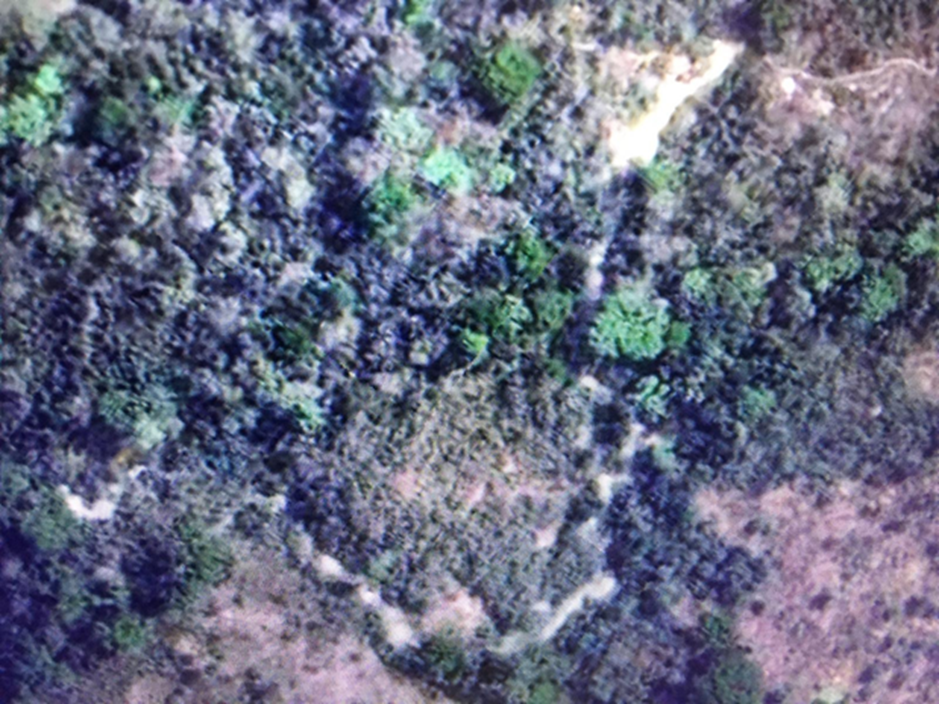
Photo: This satellite image capture of three large, active illegal Chinese goldmines is just outside of Konobendu, after Sandaru. The mines are interconnected with smaller sites. This is where some of the heavy equipment operates.
This place is of great significance to the country’s leadership, which is why the by-election, which took place in February this year, was bloody. A young contender had defiled the ruling party’s wish by breaking ranks and going on to stand as an independent candidate against the party’s nominee. During the brutal campaign, the ruling party brought men from Kailahun to intimidate villagers in the constituency. They attacked a young supporter of the independent candidate in a village called Gbongboma and beat him to death.
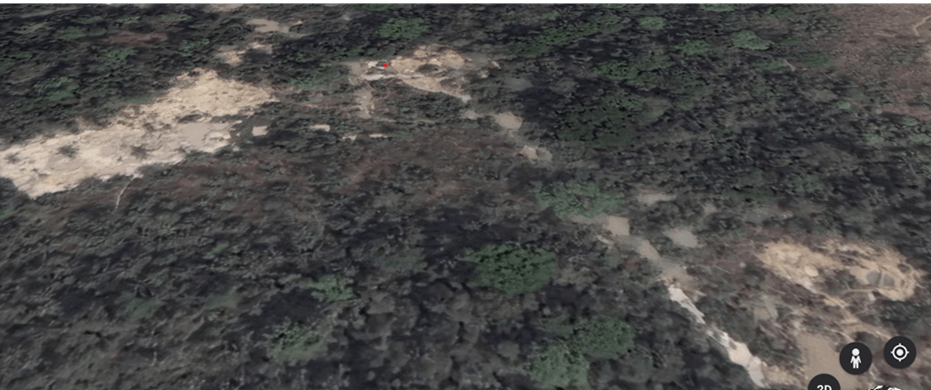
Photo: This satellite image of a large mine outside of Njama has its own camp, and heavy equipment is stationed there.
Videos of the incident are extremely disturbing. No one has ever been arrested or charged with the murder, even though the ruling party knows who is responsible.
Ruling Party wish enforcers are now the new arbiters. A party agitator called ‘Chuckie’ from Kailahun is nicknamed after Charles Taylor’s murderous son Chuckie Taylor, who is currently serving ninety-seven years in a US jail for crimes against humanity; the gruesome murders he committed during Liberia’s civil war. Chuckie Taylor ran the ‘Demon Forces’ (The ATU – Anti-Terror Unit, which acted as security for his father Charles Taylor of Liberia. He oversaw people being beaten to death, or burnt or buried alive. Chuckie Taylor’s Landcruiser number plate only read DEAMON. Our very own ‘Kailahun Chuckie’ is a menace to villagers and has now become the go-to man whenever there are party political issues in the district.
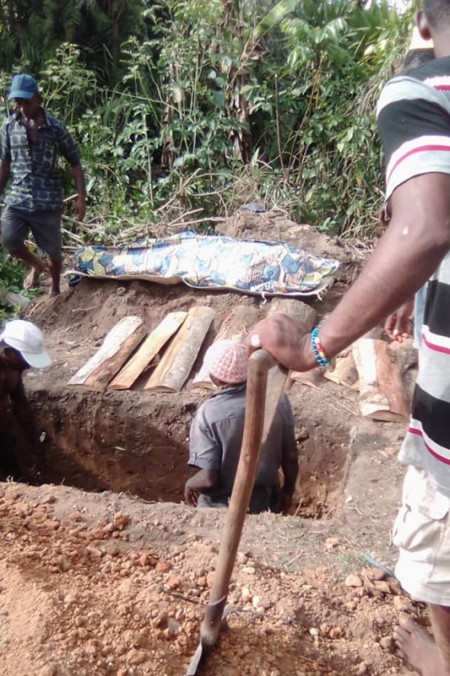
Photo: Body of the young supporter being prepared for burial.
On the 22nd May this year, the president went with a large entourage to Kailahun to open a new party office they have built. In tow were his ministers, party officials, heavily armed militia and hangers-on descending upon the poorest district in the country to open a small party office.
Along the paved road made by the previous administration, numerous shirtless, severely malnourished children, wearing shorts shredded with wear, waved palm leaves – the party’s symbol – to welcome the president and his party officials. ‘Missa Plechident!’ their creaky voices screamed.
This is one of the most food-deprived districts in the country. A comprehensive food security and vulnerability analysis published by the WFP (World Food Programme) only a few weeks ago, titled State of Food Security in Sierra Leone 2020, is devastating.
The report revealed a disturbing lack of food in the district. It showed that the proportion of populations that are food-insecure in Penguia Chiefdom, where the young supporter of the independent candidate was killed, and where the illegal Chinese goldmining and logging are taking place, is between 77% and 93% (dry season and rainy season respectively).
Of all the chiefdoms in Kailahun District, only Malema Chiefdom has the lowest proportion of food-insecure populations at 23%. This is a devastating revelation. There is no college or university here in Kailahun, no skills training institute for the large number of idling young people in towns and villages, and no properly functioning hospital or maternity clinic.
Years ago, anyone who opposed the ruling party, especially women, were stripped naked and paraded at the town’s infamous roundabout in broad daylight. ‘This is Kailahun,’ people tell you, seemingly mirthful. Last year a Kailahun MP, Hindolo Moiwo Ngevao, who spoke to the BBC and exposed that the country’s MPs are corrupt, was swiftly suspended and removed from the party’s leadership responsibilities.
Kailahun District used to have the most prestigious teacher training college in Sierra Leone – The Bunumbu Teachers College, which, just before the war, was about to be turned into a university. In addition, Kailahun had the best hospital outside of Freetown, The Nixon Memorial Hospital, which was staffed by British doctors. Kailahun also had some the most outstanding secondary schools, including Westley Secondary School, National Secondary School, Holy Ghost, MSSK, and Njaluahun Girls’ Secondary School (the only boarding school for girls in the district). All these institutions are now either dead or on life support; the college has been stripped of its status and transferred to another district, Njaluahun Girls school is now a forest, and Nixon Memorial Hospital was recently threatened with closure.
As we were heading back to Freetown from the Chiefdom on the 24th May, the president and his entourage were also returning to the capital from Kailahun. My colleague spotted a police motorbike blaring behind us on the road at high speed to clear the way, and he drove right into the shrubs along the highway in order to stop and give way to them. I gasped, but he turned and looked at me. ‘If them kill you na ya na buff case!’ (‘If they kill you here nothing will come out of it!’) he quipped as he looked at his rear-view mirror again.
I remained sitting in our vehicle, counting top-range 4x4s and supporting vehicles cruising at well over 90mph on the one-lane ‘motorway’. There were over fifty of them in two separate convoys, and the leading group had a highly secured converted black pick-up truck that my colleague said was a bank vehicle. ‘He takes money wherever he goes to bribe local chiefs,’ he said. Local chiefs, most of whom have never touched bulk money over $100, have been showered. No wonder they are dressing their malnourished children with palm leaves and sending them to the motorway to welcome Missa Plechident.
Driving over fifty vehicles across the country to an impoverished district to open a small party office in a place that hasn’t even got electricity, running water or flushing toilets tells you the mentality of Sierra Leone’s leaders. The per diem alone of one minister and their own cabal over that weekend is enough to drill a borehole to provide sustainable water for a whole village!
Sierra Leone’s sickness is a combination of wretched deficiency in leadership, repulsive corruption and outright disregard for the rights and liberties of its citizens, who are sold out for personal gains. This small but resource-endowed country is being systemically decimated by greed.
Last week, a worker filmed a shocking scene of a Chinese manager attempting to impale a Sierra Leonean foreman in their mines in Tonkolili, Northern Sierra Leone. This is the clearest picture of how young Sierra Leoneans are beginning to respond to encroachment upon their rights and liberties.
The scene started with the Chinese manager verbally abusing and threatening the foreman and violently slapping a clipboard from his hands in extreme rage. The young foreman responded with a typical kungfu kick aimed at between the legs of the Chinese manager. The Chinese manager ran at the back of the scene and plucked a steel post that he aimed at the foreman. In self-defence, the foreman let go another kungfu kick that sent the Chinese manager to the floor, outrightly humiliated. Within hours, the video went viral across Africa and the diaspora, and was reported in places such as South Africa.
This has never happened in Sierra Leone before, and it has been touted as a turning point in the Chino-Africa relationship. Young Sierra Leoneans are no longer waiting for their government to act to protect their rights and dignity. Chinese managers beating local labourers had been very common in Africa, but this single incident will hopefully change all that.
If the young foreman had waited for his government to protect him, he would have been killed, impaled by the Chinese manager, and, as my colleague said to me on the highway, ‘na buff case!’. For if the president, the minister of mines and mineral resources, and the resident minister, Eastern Province are involved in illegal and corrupt Chinese goldmining and logging, which police officer or judge in the country will sit on the case of a murdered labourer?
Even the killing of a young supporter of an independent candidate in broad day light never went beyond a local police pretentious ‘investigation’, and that was the end – ‘buff case!’
Source: The Sierra Leone Telegraph


